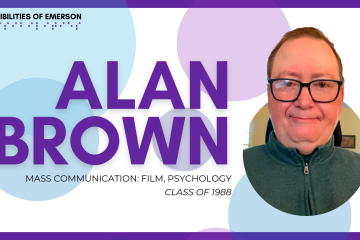

Shanae Burch ’10
Shanae Burch, 2013
Bio: Shanae Burch is a first-year doctoral student at Teachers College, Columbia University where she is studying Health Education after receiving her Masters in Arts in Education from Harvard Graduate School of Education and BFA in Acting from Emerson College. As a digital and performance storyteller, she believes personal narratives have the power to equip communities with the tools to forestall and even reverse the projected health outcomes that result from the social determinants of health. She has continued to pursue theater professionally as a proud member of Actors’ Equity Association, and grateful for every opportunity to apply it to her work in both academia and community health settings.
How did you get into Health Literacy?:
It might be surprising to some, but I actually entered Emerson’s BFA Acting program very much with a commitment to a career in health. I had grown up with aspirations of becoming a medical doctor, so when I was told by a mentor the summer before my senior year of high school that “Medicine was great, but theater could heal people too”, lightbulbs went off almost instantaneously. The U.S. Department of Health and Human Services has an initiative called Healthy People, and they define health literacy as “the degree to which individuals have the capacity to obtain, process, and understand basic health information and services needed to make appropriate health decisions”. The more I studied theater and immersed myself in the art world, the further I was convinced of the translating power of narratives to eradicate health disparities. If you can believe it, performing in “Milk Like Sugar” by Kirsten Greenidge at the Huntington Theater was an actualization of many dreams.
How did Emerson (via an experience and/or faculty or staff member) help shape you as a young professional?:
I’m not entirely certain I had ever referred to myself as a young professional before joining the local, professional sorority – Kappa Gamma Chi. Iron truly sharpens iron in those instances though because I owe a great deal of growth to our sisterhood and the Office of Student Life staff. We did our best to call the gold out of one another, and continue to do so even four years later. In addition to the Performing Arts department faculty and the rich experience that was performing with Emerson Stage, I must also point to Dr. Angela Cooke-Jackson and the course, Culture, Diversity, and Health Communication, since our relationship concretized my interdisciplinary desire by deepening my understanding of the social determinants of health and expanding my vision towards storytelling for health literacy.
What advice would you offer an artist with a dual interest in arts and health and/or human services?:
You know how people say, “Stay in your lane” when they’re feeling threatened by your dreams? Don’t do that. That’s not how health equity will be achieved. Edwidge Danticat wrote to “Create dangerously for people who read dangerously”, and I couldn’t agree with her more. We have stories to share, and as artists, it is our duty to pass our metaphorical mics around the room. Our goal isn’t “to give voice” to anyone, but we sure can amplify and provide platforms for influence.
Can you talk a little bit about your work with Sister to Sister?:
Absolutely! Community Conversations: Sister to Sister (CC) is a Cambridge-based women’s health initiative that aims to address barriers to improved health outcomes in the Black community and to empower community members as they navigate the medical system in search of the highest quality care for themselves and their families. It was Dr. Cooke-Jackson who actually introduced me to the organization’s leaders shortly after I graduated from Emerson, and I’ve been volunteering with them ever since. I was initially recruited as an intern to conduct qualitative interviews for Outcomes research, but have had the opportunity to serve as a fellow – overseeing some development projects and serving as a Jr. faculty member for salon conversations like “Wellness: How to Incorporate Healing into Our Daily Lives” and “Parenting Young Adult & Adult Children – Establishing Reciprocal Respect”. What was really special about the latter is that my mom actually joined me on the panel, and I was able to share this incredible organization with her, but also share her with them. Though I’ve moved to NYC, I cannot foresee my work with CC ending any time soon.
What piece of advice would you offer a senior about to embark on the working world?:
One of the most valuable things you can do for yourself and the greater good of your community is to actively seek ways to “unlearn”. Unlearn your prejudices, preconceived notions, and those certain partialities protected as preferences and that deep down embody –isms. These are the things that hinder your ability to listen for meaning and not merely response. The working world needs that more each day.


